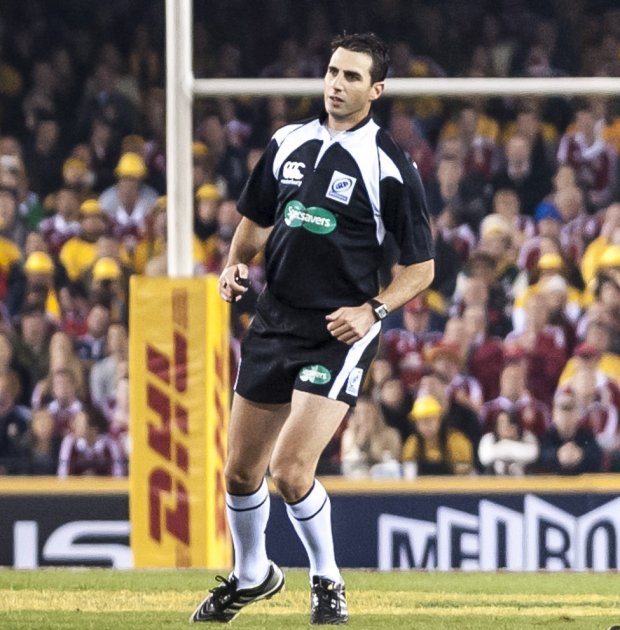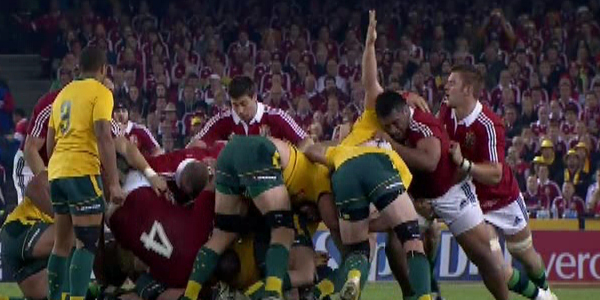
Behind the sentiment and romance of the Lions lurks an uncomfortable truth.
When the Lions last won a series, back in 1997 against the Springboks, they lost the try count 9 tries to 2 – their only victory in the professional era.
When they last won a series in Australia in 1989, they lost the try-count 6 tries to 3.
Even in 1971 in New Zealand, the first tour to establish the right balance of romance and pragmatism under the coaching stewardship of Carwyn James, the try count was still 8-6 in favour of the All Blacks.
The truth that the Lions will not beat you by scoring tries has been confirmed on the current tour. The main threat to Wallaby success by far is the boot of Leigh Halfpenny. He kicked 5 out of 6 in the first Test when the Wallaby kickers missed five shots at goal and he kicked 5 out of 7 in the second. Even those he missed were on target but slightly outside his range.
The Wallabies now know that conceding a penalty anywhere up to about 48m from their own posts is a virtual ‘gimme’ for the Lions goal-kicker.
The scrum & breakdown penalty stats
The first two Tests have shown that the vast majority of penalties will be awarded at either the scrum or the breakdown. Of the 44 penalties awarded in the two games so far, 24 have been for offences at the breakdown [55%] and 8 for offences at the scrum [18%].
Of the 21 kickable penalties, 17 have come from one of these two situations. That’s a massive 81% of all penalty scoring opportunities! 63 points have been offer to the side that can decode the referee’s interpretation of the scrum and breakdown more accurately.
Refereeing interpretation of the breakdown
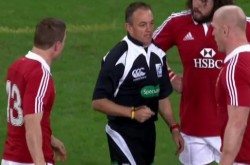
There was a huge shift in refereeing interpretation between Chris Pollock in Brisbane and Craig Joubert in Melbourne. Basically the referee can take one of two views at the tackle area. He can either choose to emphasize the law relating to the tackler
- “The tackler must immediately get up or move away from the tackled player and from the ball at once.” [15/4b]
Or he can put more stress on the law relating to the ball-carrier
- “A tackled player must immediately pass the ball or release it. That player must also get up or move away from it at once.” [15/5b]
Very rarely do you find, in the real time of international matches, a referee who can pay attention to both sides of the law equally. With every ref there is a preference, and international teams spend a lot of time researching and preparing for them.
In the first Test, Chris Pollock refereed the tackle area from the perspective of the first rule and demanded that the tackler or tackle assist move away from the ball-carrier as a ‘first action’. This clearly favoured the Australian offense. The Lions conceded a colossal 9 penalties at all breakdowns and 6 times at defensive breakdowns, basically for the same offence in different clothes – not moving away from the tackled player.
As a result the advantage I indicated the Lions would have in the following article https://www.greenandgoldrugby.com/analysis-why-injuries-may-force-the-lions-to-play-their-best-hand/ [see #7 ‘Day of the Jackal’] never materialised. All of the Lions good jackals were pinged by Pollock – O’Driscoll was nearly yellow-carded for repeated infringements early in the match [4’ and 6’ “not supporting bodyweight”], and O’Connell [67’ “not releasing the tackled player”], Heaslip [61’ “playing the 9”], Mako Vunipola [74’ “side entry”] and Sam Warburton [53’ “no release”] all received the same treatment.
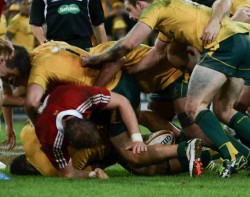 Pollock did not demand that the Wallaby cleanout do its job and blow the jackals off the ball, he only asked that they made contact with the opponent. This completely neutered an important advantage going into the game for the Lions. There is no doubt in my mind that Australia would have won this match comfortably had they been able to keep Christian Lealiifano on to kick the 14 kickable points they left unwanted on the turf of Suncorp stadium.
Pollock did not demand that the Wallaby cleanout do its job and blow the jackals off the ball, he only asked that they made contact with the opponent. This completely neutered an important advantage going into the game for the Lions. There is no doubt in my mind that Australia would have won this match comfortably had they been able to keep Christian Lealiifano on to kick the 14 kickable points they left unwanted on the turf of Suncorp stadium.
Craig Joubert, a far more experienced international official than Pollock, refereed the second Test predominantly from the second rule, demanding an immediate release from the ball-carrier. The interpretation turned a complete 180 and all of a sudden the Lions’ jackals were in the game with a vengeance!
The Lions were awarded 8 penalties at the tackle area, 5 of them for Wallabies failing to release the ball. Sam Warburton [3’ & 49’], Jamie Heaslip [6’], Mako Vunipola [10’] and even replacements Conor Murray [55’] and Sean O’Brien [79’] all profited from Joubert’s judgments. The penalty count was 9-4 in the Lions’ favour at the half and Joubert’s interpretations had given them control – a control they unfortunately passed up through their determination to kick their ball away throughout the game.
What it means for the Third Test
Another consequence of Joubert’s breakdown interpretations is that they effectively did for Michael Hooper. Hooper won no ball at the Lions’ rucks and even lost one he took into contact against Sam Warburton [3’]. As I pointed out in a previous article https://www.greenandgoldrugby.com/analysis-why-the-wallabies-will-miss-george-smith/ [“Hooper and Smith as competitors at the tackle”], Hooper is only really viable as a starter if you have a George Smith to provide the stickability he lacks at the tackle area.
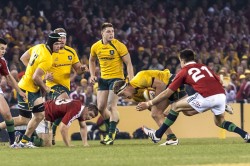 The presence of Smith is essential to release Hooper as a runner and support player and make best use of his phenomenal field coverage. For that reason I would be surprised if we don’t see Hooper and Smith on the field together – probably with Ben Mowen moving into 8 and Rob Simmons coming on to add an extra lineout target – sometime from the 45’ onwards in Sydney.
The presence of Smith is essential to release Hooper as a runner and support player and make best use of his phenomenal field coverage. For that reason I would be surprised if we don’t see Hooper and Smith on the field together – probably with Ben Mowen moving into 8 and Rob Simmons coming on to add an extra lineout target – sometime from the 45’ onwards in Sydney.
The referee for the game in Sydney is Frenchman Romain Poite, and his style of refereeing at the tackle area will be far closer to that of Joubert than it is to Pollock. In other words he will favour the defensive player in most 50/50 situations. In the meantime selection has altered the jackalling balance quite dramatically towards Australia, and I think Robbie Deans’ selection of George Smith could turn out to be a major coup.
The Wallabies will now have the best player at the tackle area on the field bar none [even though Sean O’Brien is very good], and they have the option of introducing Hooper early in the second half. The Lions have chosen to drop Brian O’Driscoll, Jamie Heaslip and Mako Vunipola [to the bench] and they have not replaced them with people who can play at the tackle. So now it will be Smith, AAC, Benn Robinson and Ben Mowen against O’Brien and Jon Davies on the Lions side. This has now become, quite suddenly and unexpectedly a big area of advantage for Australia.
Scrum interpretations and Ben Alexander
Benny Alexander has fully justified Deans’ faith in him after two Tests. The starting Wallaby front-row only gave up two non-kickable penalties against the Lions in Brisbane while the reserve props engineered a crucial 5m scrum turnover in the last 10’ of the match and won the penalty that gave Kurtley Beale one last chance at redemption with the final kick of the game. Edge Australia.
In the game at Melbourne, Alexander milked three penalties, one free-kick and one heel against the head out of Mako Vunipola as the Wallabies attacked across the front of the Lions front row. Although the Lions managed to patch up some of the technical issues at two scrums before half-time [26’ and 32’], and their bench front-row of Vunipola/Hibbard/Cole reversed the negative outcomes of the week before, the Wallabies still came out roughly even with a 3-3 penalty count and a 9-6 loss in points kicked off scrum penalties.
Vunipola is what they call in the NFL a ‘wide-body’ who struggles to keep ahead of the opposing tight-head and preventing him working through the 1-2 bind . As Scott [and forum commentator ‘Nutta’] explained in his second scrum article Vunipola’s poor mechanics tend to leave him disengaged on the side of the scrum and effectively gave the Wallabies a 3 on 2 in the front row.
Countering the ‘Corbisiero angle’
If Alexander believes that running out ahead of the Wallaby team for his 50th cap was a great occasion, his 51st is likely to prove even more memorable for quite different reasons! Warren Gatland has thrown all his eggs into the basket marked ‘scrummaging’ for the final game in Sydney with the selection of Alex Corbisiero, Richard Hibbard and Adam Jones. Each one of this trio would probably be acknowledged by their peers as the best pure scrummagers in their positions in GB and Ireland. Cian Healy and Tom Youngs might well be better all-rounders at 1 and 2, but if all you want to do is scrum, Corbisiero and Hibbard are your men.
Corbisiero is not the same animal as Vunipola at all. At the scrum he is of tremendous help to his hooker because of his ability to stay above the opposing tight-head, even if this requires a very acute angle:
http://youtu.be/shZtoH44uIs?t=31m47s
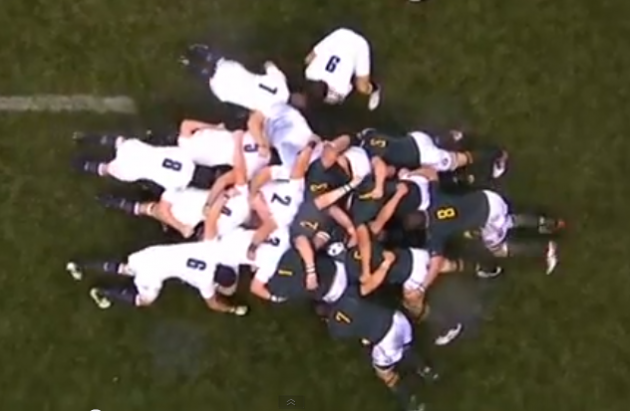 As soon as Corbisiero feels the Springbok tight-head Jannie du Plessis trying to work his way on to hooker Tom Youngs, he angles into him sharply by tucking his right shoulder underneath his hooker. At 18:14 he is scrumming at a hard right angle on to du Plessis. Although this creates something of a black hole for the man pushing behind him, the fact that he is going forward means that only one side can win the penalty from referee Nigel Owens.
As soon as Corbisiero feels the Springbok tight-head Jannie du Plessis trying to work his way on to hooker Tom Youngs, he angles into him sharply by tucking his right shoulder underneath his hooker. At 18:14 he is scrumming at a hard right angle on to du Plessis. Although this creates something of a black hole for the man pushing behind him, the fact that he is going forward means that only one side can win the penalty from referee Nigel Owens.
Within half an hour of this match the Springboks had been reduced to taking lineouts instead of scrums when they were given the option.
The other problem for Alexander is that Hibbard is a lot bigger than Youngs and has more size and power with which to repel a tight-head coming across the tunnel.
The bottom line is that Alexander and the Wallaby front row cannot hope to operate against Corbisiero/Hibbard as they did against Vunipola/Youngs. Their ability to come up with a new and successful strategy will determine the distribution of scrum penalties throughout the game.
Romain Poite – ‘Ming the merciless’ at scrum-time
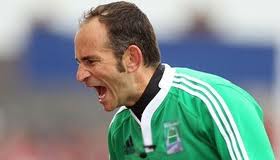
And scrum penalties there will be, in any match controlled by M.Poite! Poite has a reputation in the northern hemisphere for sniffing out the weakest member of the six front-rowers and penalising him mercilessly. He is also a ‘three-and-out’ ref who will not hesitate to yellow-card his victim after the third penalty for repeated infringement.
This was the fate that befell Martin Castrogiovanni, the veteran Italian tight-head, after he popped out of the roof of a retreating scrum for the third time in the 58’, in the Six Nations battle against a Welsh front row containing Hibbard and Adam Jones.
Whatever Ben Alexander does, it needs his full concentration. I believe Alexander’s occasional failures in set-up are primarily due to his tendency to drift in and out of matches mentally rather than in a terminal problem with technique. He will need to be consistent on Saturday because this Lions’ front-row has been selected simply to blast away at the scrum face for 50-60 minutes.
Warren Gatland’s selection in general has brought play closer to the set-piece for the Lions and further away than ever from the multi-phase, ball-in-hand possession play traditionally favoured by Australia. It is a real polarization of hemispheres. The Lions will probably play a pressure game in the scrum and from driving mauls from lineout and try to maximise their penalty opportunities. Phase sequences will not go beyond the first five or six phases before the ball is kicked away to Australia.
With George Smith back in harness at the breakdown and a tight five who can beat their opposite numbers for work-rate and field coverage for the first hour, the Wallabies are much better-placed to operate a possession offense than they were in the first two Tests – if they get enough primary possession.
- Can the Lions create the opportunity for M. Poite to penalise and/or card Ben Alexander at set-piece?
- Will the Lions leadership core, deprived of its three senior pros in Paul O’Connell, Brian O’Driscoll and Sam Warburton, stand up in critical situations?
- Can the Lions match the Wallabies at the breakdown with George Smith starting and their own front five more powerful, but less active and mobile than before?
The Lions probably need to answer all these questions in the affirmative in order to win tomorrow.
It is an unlikely prospect.

